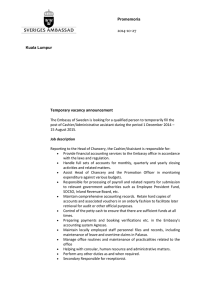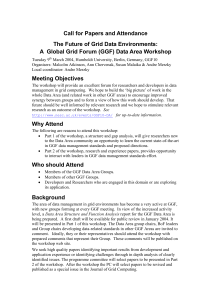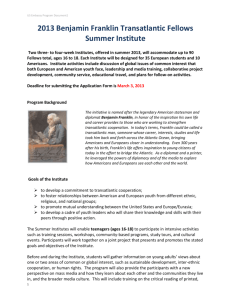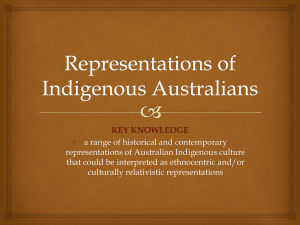Page of 7 Document A: Good Governance Fund (GGF) – Strategic
advertisement
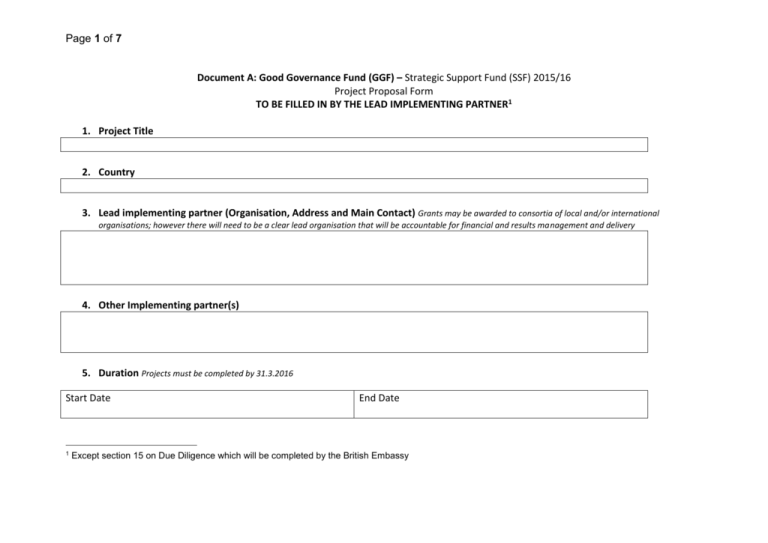
Page 1 of 7 Document A: Good Governance Fund (GGF) – Strategic Support Fund (SSF) 2015/16 Project Proposal Form TO BE FILLED IN BY THE LEAD IMPLEMENTING PARTNER1 1. Project Title 2. Country 3. Lead implementing partner (Organisation, Address and Main Contact) Grants may be awarded to consortia of local and/or international organisations; however there will need to be a clear lead organisation that will be accountable for financial and results management and delivery 4. Other Implementing partner(s) 5. Duration Projects must be completed by 31.3.2016 Start Date 1 End Date Except section 15 on Due Diligence which will be completed by the British Embassy Page 2 of 7 6. Funding Amount requested from the British Embassy £……………………………………. Total estimated project budget £…………………………………… Outline partner contributions where applicable 7. Programme Outcome The Strategic Support Fund is part of the Good Governance Fund (GGF) Programme. Click on the development tracker to search for the Good Governance Fund’s Business Case http://devtracker.dfid.gov.uk/. The GGF expects to: Support states to become more resilient to political and economic external and internal shocks. (Impact) At programme outcome level this will entail: Higher rates of investment and job creation to support inclusive growth Demonstrable and perceived open, accountable and responsive governments More informed and active populations that can hold government to account Projects under the Strategic Support Fund are expected to contribute to at least one of the above outcomes. Tick which outcome(s) this project will contribute to. Page 3 of 7 8. Project Purpose Within the parameters of the outcome(s) above, and alignment to reform priorities identified and agreed with host governments, please state what is the specific change this project is expected to contribute towards. 9. Outputs What are the main outputs (results) of the project and how they will be measured? Outputs Indicator Baseline This is the specific product and/or services the project will deliver. Output 1 Output 2 Output 3 10. Gender inequality What will be measured (e.g. the number of people who will be trained; the increase in positive perceptions of an issue) The current status (e.g. no training exists; current perceptions are x% positive) Sources Target/Date Where will the information on the baseline data and targets come from (e.g. data from research carried out by the implementer; open source data) What the project will deliver (e.g. 100 people trained; 50% increase in positive perceptions) Page 4 of 7 The International Development (Gender Equality) Act 2014 promotes gender equality in the provision by the Government of development assistance and humanitarian assistance to countries outside the United Kingdom, and for connected purposes. See link for more details: http://www.legislation.gov.uk/ukpga/2014/9/pdfs/ukpga_20140009_en.pdf. Provide a proportionate statement in how this project will contribute to reducing gender inequality. 11. Value for Money State how this project will represent good value for money. See the attached Document C for more information Page 5 of 7 12. Project Budget To be considered for funding, the lead implementing partner must complete the activity based project budget template. See Document B. 13. Risks What are the key fiduciary, delivery and reputational risks associated with this project and how will you manage these? Description of Risk identified Likelihood Impact Management Overall all risk rating To help manage/mitigate the risk be as specific as possible about the risks identified High, Medium or Low High, Medium or Low How will the risk be managed and monitored, what are the mitigating actions and who is the risk owner Once risks are managed state whether the overall risk is High, Medium of Low (1 – 5) Page 6 of 7 14. Monitoring and Evaluation Project reporting during implementation The frequency and nature of reporting during the project should be agreed between the lead implementing partner and the relevant UK Embassy. This should be agreed before the project commences and should be proportionate to the size and duration of the project. Set out how you will monitor/evaluate the project. NB The relevant UK Embassy will ensure a short Project Completion Review is conducted for all SSF funded projects. This must be completed within one month of the project end date. As part of this, the review will assess the extent to which the project outputs have been delivered and whether it has sufficiently contributed to the overall outcomes of the GGF Programme. Among other points, it will consider whether the project delivered on time and on budget, whether the project provided value for money and how well the risks were managed. Please state if there are plans for project review by other implementing partners. End of Project Reporting Requirements *Narrative and Financial reports* Two weeks after the end of the project, the lead implementing partner should submit a narrative report focusing on outputs delivered, contribution to the overall outcome and key challenges. The lead implementing partner should account for all funds awarded at the same time. The partner will also need to provide an annual audited account statement for the year in which the project resources were disbursed no later than three months after the end of the financial year(s) in which the project took place. This project may also form part of the overall GGF review which will take place between March and June 2016. Page 7 of 7 15. Due Diligence [TO BE COMPLETED BY THE BRITISH EMBASSY] The lead implementing partner should provide sufficient assurance to the relevant UK Embassy that it has sufficient capacity and capability to manage the grant and deliver the project to a good standard. Comment on the lead organisation’s ability to deliver, its financial stability, governance and controls and (if relevant) managing downstream partners (sub-contractors).
